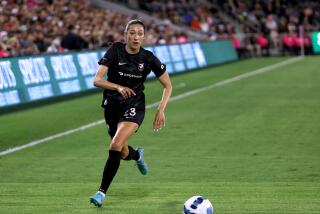Crow Slices a Humble Pie as Sockers Set to Meet Minnesota
SAN DIEGO â It was the final day of the soccer season. Amador Valley High School fans in the soccer hotbed of Pleasanton had come to see Kevin Crow break the schoolâs goal-scoring record. Early in the second half, the anticipated moment seemingly arrived.
An opposing player tripped Crow in front of the goal, resulting in a penalty kick. No soccer shot is easier to make.
Except Crow declined to take the shot.
âI couldnât believe it,â Amador Valley Coach Mike Geib said. âKevin gave the shot to a kid who was in a slump. That tells you what type of player Kevin was.â
Now, Crow is a defender for the Sockers, who begin the Major Indoor Soccer League semifinals Sunday night in the Sports Arena against Minnesota.
Success has not changed Crow. He still tries to be the humble player he was six years ago when he stepped aside for another player at Amador Valley.
âThe other player had been in a slump for a month,â Crow said. âItâs a team sport. I could care less about individual awards. Iâm appreciative when I get them, but Iâm not in this game for publicity and fame.â
Crowe was a prep All-American. He was a second and third-team All-American his final two years at San Diego State. He played for the USA team in the 1984 Olympic Games. And he led the MISL in blocked shots this season.
Crow was a second-round draft choice of the Sockers in 1983. Their first choice was Crowâs San Diego State teammate, Kle Kooiman, who now plays for the Los Angeles Lazers. The Sockers had rated both players even, but they took Kooiman first because Tulsa was going to take Kooiman in the first round if he still was available.
Originally, the Sockers offered Crow an amateur contract. They finally settled by paying him $500 a month.
At the time, the Sockers were nearing their second straight indoor championship. They were in need of defenders at the end of the season, but they called on Nico Rohmann instead of Crow.
âTo tell you the truth, I was disappointed when they didnât let me play,â Crow said. âIt cost them a lot of money to bring back Nico Rohmann. They had me for $500 a month.â
The Sockers wanted Crow to concentrate on outdoors at the time. And they certainly needed him.
When the Sockers beat Baltimore for the MISL championship in 1982-83, they did not have a break before starting outdoor play. Crow, one of the teamâs few fresh players, played every minute of every game his first outdoor season.
âKevin had to play, and he played well,â Coach Ron Newman said. âWe got off to a 1-10 start or some bloody stupid thing like that, but he was one of our strongest players. That gave him all the confidence in the world.â
Soccer players have a tendency of going all-out in practice, sometimes even at the expense of arguing with teammates. But according to teammates, Crow was never one to get in the middle of a team feud.
âIâve never been the type to yell at a teammate,â Crow said. âYou have to rely on your teammates. Everyone makes mistakes. Unless you are flawless, you shouldnât yell at people.
âYou can do things in a nice, calm way. Iâm the same way with referees. I try to be diplomatic with them and understand their situation. I find that you get more out of them that way.â
At times, Crowâs diplomacy gets him into trouble with coaches. After Newman called a timeout last week against Kansas City with a four-goal lead and three seconds to play, Crow did not stand up for his coach.
âTheyâll take that as a rub in their face,â Crow said at the time. âI would if I was their team.â
A week later, Newman is still miffed by Crowâs comment.
âSometimes, youâd like to see him be more supportive of the team as a whole,â Newman said. âMaybe heâll eventually realize that. Maybe heâs just young.â
Crow, 23, was eight years old when he was encouraged by an older brother to begin playing soccer.
But as a high school freshman, Crow spent a difficult season away from soccer. He was physically unable to play because he had grown seven inches in a year and his bones were not keeping up with his rapid growth. He overcame the problem before his sophomore season.
Crow subsequently played three years for Amador Valley, helping the school set a national record for most consecutive games without a loss (55).
Crowâs coach described him as a self-made player.
âWhat made him different than a lot of high school kids was that heâd practice by himself,â Geib said. âHe would kick the ball against a wall repeatedly. Iâd compare him to a basketball player who would shoot 1,000 times a day on his own.â
Soccer was time-consuming for Crow. Even away from the field, he hung out with other players and continually talked about soccer.
If Crow wasnât so humble, he could have talked about personal success. He is Amador Valleyâs third-leading career scorer, and he still is tied for the goal-scoring record.
College coaches were well aware of Crow during his prep days. He finally chose San Diego State over California because âyou could enjoy itâ at San Diego State.
The Aztecs immediately enjoyed having Crow, Coach Chuck Clegg said. Crow was among their top forwards for two years, then he switched to defense when the team had a shortage of players in back.
Through the years, Clegg saw why Geib always talked of Crowâs work ethic.
âKevin was very intelligent,â Clegg said. âHe never tried to impress people by talking. The reason Kevin progressed so much was because of Kevin. No one else can take credit for his success.â
Crowâs progress may soon include becoming the first American-born player ever to compete in the English First Division.
âHeâs the best center-defender ever on one of my teams,â Newman said. âAnd Iâve played in the English First Division. In my judgment, he wouldnât have any problem playing there.â
When the Sockersâ season concludes, Crow hopes to hear again from a team in Manchester.
âA lot of people there donât want to believe an American can come in and play,â Crow said. âYou can understand their thinking, but times are changing. Iâd like to give it a try. If things didnât work out, I could come back here in a year.â
Crow has long been considered to be among the best Americans in soccer by his peers in the MISL and North American Soccer League.
âI donât want to be considered just a good American player,â he said. âItâs like when we were playing outdoors. I didnât want to play just because you had to have a certain number of Americans on the field. I wanted to play because I was good enough, not because I was an American.â






